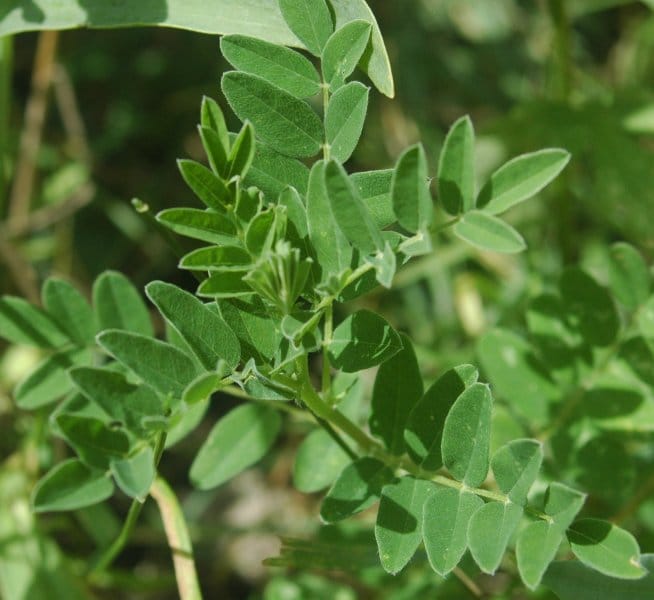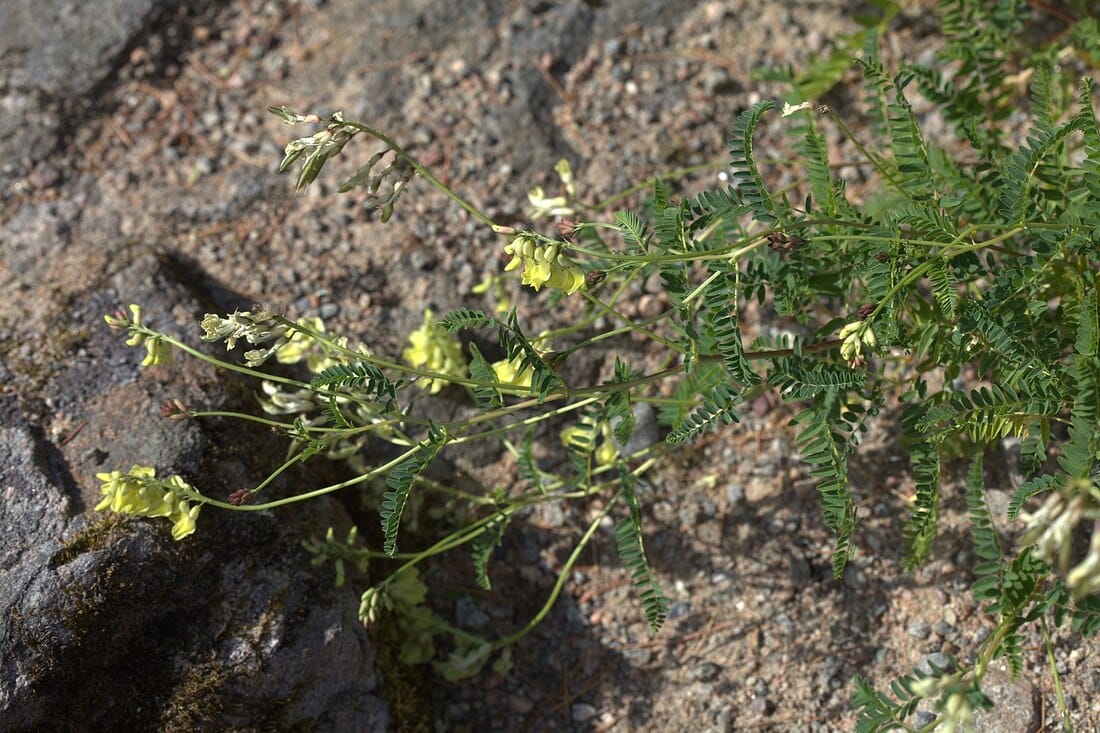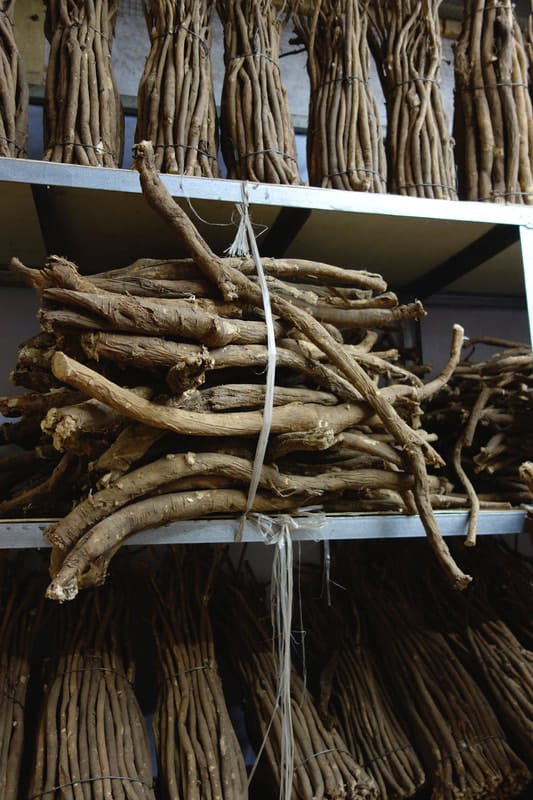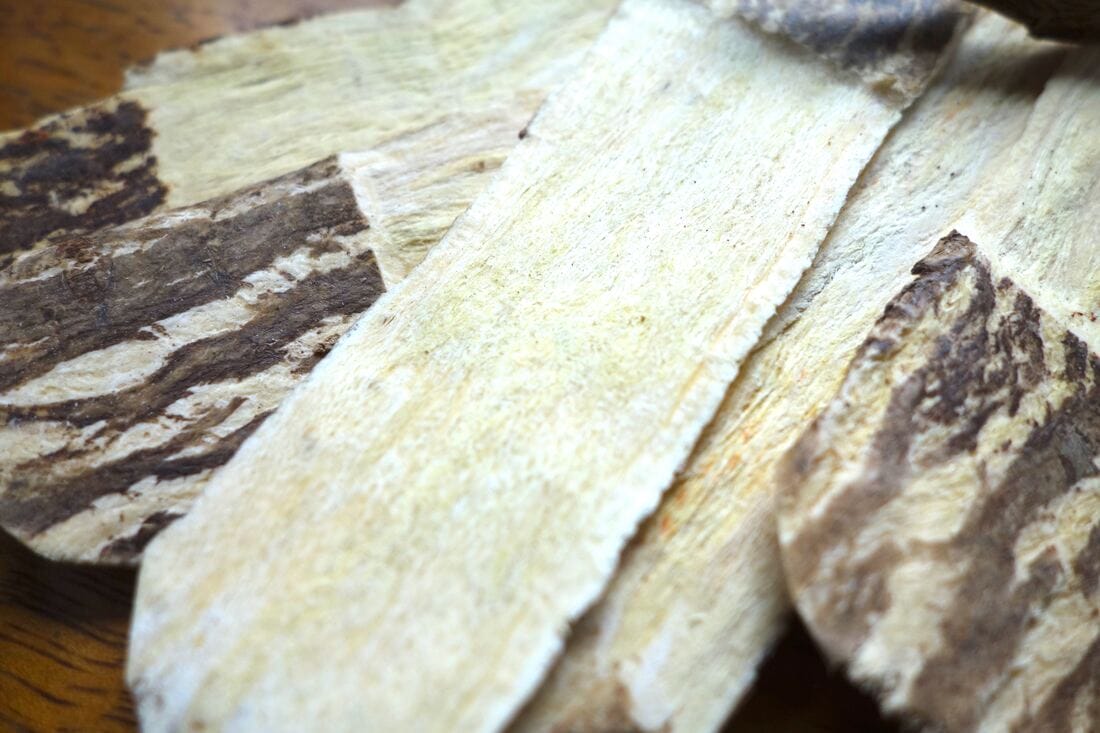Astragalus, Huang Qi 黄芪Huang Qi (TCM) |

|
Ledebour, C.F. von, Icones plantarum novarum, vol. 4 (1833)
 Astragalus membranaceus
Astragalus membranaceus(Photo by Doronenko) (Wikimedia) |
 Astragalus mongholicus
Astragalus mongholicus(Photo by Averater) (Wikimedia) |
 Wild Astragalus Huang Qi root bundled at the Chengdu Medicine Market. (Adam, 2016)
Wild Astragalus Huang Qi root bundled at the Chengdu Medicine Market. (Adam, 2016) Steamed and flattened Huang Qi (Adam, 2017)
Steamed and flattened Huang Qi (Adam, 2017)Botanical name:
Astragalus pp.:
- Astragalus membranaceus (syn. Astragalus propinquus)
- Astragalus mongholicus (syn. Astragalus membranaceus var. mongholicus)
See also Astragalus et al., Srad ma སྲད་མ
Parts used:
Root
Different varieties are seen on the market, both Wild and Cultivated:
- Black-skinned (Hei Pi Qi [‘Black skinned Qi’), from A. membranaceus
- White-skinned (Bai Pi Qi [‘White-skinned Qi’]), from A. membranaceus var. mongholicus
- Red Astragalus (Honq Qi); from Hedysarum polybotrys (see Substitutes below)
Temperature & Taste:
Warm, dry. Sweet
Classification:
N. Qi Tonic
Uses:
1. Tonifies the Spleen and Stomach, Increases Qi:
-fatigue, poor appetite, diarrhea
-used where Spleen fails to manage the Blood; chronic bleeding disorders with weakness
-increases Qi and nourishes Blood; useful for conditions with Qi and Blood deficiency, or marked Blood deficiency
-Fever from Qi deficiency.
-Numbness and Paralysis associated with Qi and Blood deficiency
2. Tonifies the Lungs, Stops Cough:
-chronic Cough and Wheezing associated with Lung weakness
3. Strengthens the Surface, Stops Sweating:
-consolidates the skin to protect from Wind and Epidemic pathogens; good for those who regularly catch Cold and Flu
-Spontaneous Sweating associated with weakness
-used to promote Sweat in conditions where diaphoretics have not worked
-used simultaneously with diaphoretics for weakness in those with Cold and Flu
-Chills and Fever, Malarial Fever (Ben Cao Gang Mu)
-‘It brings about perspiration, and stops it when there is too much.’ (Ben Cao Gang Mu)
4. Raises Yang Qi:
-special function of helping raise the ‘pure Yang’
-Prolapses associated with Qi deficiency
5. Strengthens the Kidneys, Promotes Urine:
-Edema from deficiency
-‘good for treating Antepartum and Postpartum diseases’. (Ben Cao Gang Mu)
6. Resolves Masses:
-‘disperses hard masses … eliminates Scrofula, Goiters and Polyps’. (Ben Cao Gang Mu)
-an important herb in modern Cancer treatment
7. Discharges Pus, Generates Flesh:
-chronic Sores and Ulcers that don’t heal because of deficiency
-chronic carbuncles and phlegmons (Ben Cao Gang Mu)
-‘a wonderful drug for sores, for expelling pus, relieving pain, removing blood stasis’. (Zhang Yuan Su)
Dose:
Decoction: 9–15 grams (up to 30 grams or more)
Powder: 2–6 grams
Comment:
‘It is suitable for a patient who is anemic and with a plump build, and perspires profusely. For a patient who is thin and wiry, with a dark complexion, the drug will cause fullness in the chest’. (Ben Cao Gang Mu)
Preparations:
1. Dry-Fried Astragalus (Chao Huang Qi):
Stir-fried with Bran until yellow; this makes it stronger to strengthen the Stomach.
2. Clear Prepared Astragalus (Qing Zhi Huang Qi):
Astragalus is stir-fried as above, but is lightly sprayed with water while being fried. This tonifies without cloying.
3. Honey-fried Astragalus (Zhi Huang Qi):
Clarified Honey is brought to boil at around 116–118˚C; a little boiling water is added to dilute the Honey, then it is poured over slices of Astragalus. The root is then stir-fried over a low temperature until golden and not sticky to touch. This is more strengthening, moistening and nourishing and is the most common method of preparation of Astragalus. It moves deeper into the Body, strengthens Qi of the Spleen and Stomach, and is also stronger to nourish the Blood. It is more moistening, therefore better for dryness and Blood deficiency.
An older method of preparation mentioned in Ben Cao Gang Mu involves dipping slices of thew root in Honey water, then stir-frying to dry.
4. Wine-fried Astragalus (Jiu Chao Huang Qi):
Yellow rice wine is poured over sliced Astragalus and left to soak for a while. Then it is dry-fried until yellowed and dried. This carries the Astragalus to the exterior of the Body and is more warming then unprocessed Astragalus.
5. Salt-prepared Astragalus (Yan Huang Qi):
Soak slices of the root in salt water, then steam, then remove and dry. This has a stronger effect on the Kidneys.
Substitutes:
1. Hedysarum polybotrys (Hong Qi) is an accepted substitute. It has similar indications, but is weaker to strengthen Qi. However, it is stronger to promote Urine and is therefore preferred for Edema with Qi deficiency.
2. Gum Tragacanth is obtained from a related plant and maybe used for some indications of Huang Qi in pills and powders.
Correctives:
1. Saposhnikovia Fang Feng enhances and strengthens the effect of Astragalus on the skin.
Main Combinations:
Deficiency
1. To nourish Qi and Blood after severe Blooding or Anemia, Astragalus Huang Qi with Dang Gui (as in Dang Gui Bu Xue Tang [Dang Gui Tonify the Blood Decoction]) This formula has been studied for its effectiveness
2. Qi deficiency: Debility, Fatigue, poor appetite and Spontaneous Sweating:
i. Astragalus Huang Qi with Atractylodes Bai Zhu, Amomum Sha Ren
ii. Astragalus Huang Qi with Ginseng
iii. Chronic Fatigue, Astragalus Huang Qi, Salvia Dan Shen (this was tested in a trial and found effective)
3. Spleen Qi deficiency with Damp:
i. marked by poor appetite, heaviness, fatigue, loose stool, Astragalus Huang Qi with Atractylodes Bai Zhu and Poria Fu Ling.
ii. if there is Damp and Qi stagnation add Citrus Chen Pi, Costus Mu Xiang to the above
4. Constipation in the aged:
i. Astragalus Huang Qi with Citrus Chen Pi and Cannabis seed (Huo Ma Ren) (Ben Cao Gang Mu)
ii. Astragalus Huang Qi with Polygonum He Shou Wu, Dang Gui
iii. Astragalus Huang Qi with Dang Gui, Peach kernel (Tao Ren)
5. Bleeding due to deficiency, Astragalus Huang Qi with Notoginseng San Qi and Donkey Hide Gelatin E Jiao.
6. Insomnia and Neurasthenia from Qi and Blood deficiency, Astragalus Huang Qi with Longan fruit Long Yan Rou, Dang Gui, Ziziphus seed Suan Zao Ren (as in Gui Pi Tang [Restore the Spleen Decoction])
7. To strengthen the surface of the body to protect from invading pathogens (ie. increase immunity), Astragalus Huang Qi with Atractylodes Bai Zhu and Saposhnikoviae Fang Feng (as in Yu Ping Feng San [Jade Windscreen Powder). Used for recurring Colds, shortness of Breath, Lung weakness and Spontaneous Sweating.
8. Numbness and painful obstruction from Wind-Cold-Damp with Qi deficiency:
i. Astragalus Huang Qi with Cinnamon twig Gui Zhi.
ii. Astragalus Huang Qi, Saposhnikovia Fang Feng, Atractylodes Bai Zhi, Achyranthes Niu Xi
iii. Astragalus Huang Qi, Aconitum Fu Zi
Sweating
9. Spontaneous Sweating that’s worse at night, Astragalus Huang Qi with Oyster shell Mu Li.
10. Night sweats Astragalus Huang Qi with Ophiopogon Mai Men Dong and Schisandra Wu Wei Zi.
Urinary
11. Turbid, whitish urine, decoct Astragalus Huang Qi with Poria Fu Ling. (Ben Cao Gang Mu)
12. Chronic Kidney Disease:
i. Astragalus can be added to Liu Wei Di Huang Wan (Yin Deficiency) or Shen Qi Wan (Yang deficiency)
ii. Astragalus, Rhubarb root, Rehmannia Shu Di Huang, Cinnamon
13. Chronic Kidney Failure:
i. Astragalus Huang Qi with Ginseng, Cinnamon, Licorice, Rhubarb root
14. Diabetes / ‘Wasting and Thirsting Disorder’ (overlaps Diabetes):
i. Astragalus Huang Qi with Dioscorea Shan Yao and Rehmannia Sheng Di Huang.
ii. Astragalus Huang Qi with Coptis Huang Lian, Cinnamon (Rou Gui), Pueraria Ge Gen, Gynostemma Jiao Gu Lan, Fenugreek (Hu Lu Ba), Mulberry leaf (Sang Ye) (This formula has been studied for effectiveness against type II Diabetes)
iii. Diabetic Nephropathy, Astragalus Huang Qi with Notoginseng San Qi, Epimedium Yin Yang Huo
Cancer:
15. Cancer:
i. General: Astragalus Huang Qi with Hedyotis Bai Hua She She Cao, Black Nightshade (Long Kui)
ii. Lung: Astragalus Huang Qi with Solomans Seal (Yu Zhu), Biack Nightshade, Earthworm (Di Long), Fritillaria Chuan Bei Mu, Hedyotis Bai Hua She She Cao
iii. Lung: Astragalus Huang Qi, Comfrey, Licorice
iv. Ovarian: Astragalus Huang Qi with Zedoary (E Zhu), Peach kernel (Tao Ren)
16. To support during Chemotherapy: Astragalus Huang Qi, Atractylodes Bai Zhu, Poria Fu Ling, Asparagus root (Tian Men Dong), Dang Gui, Lycium Gou Qi Zi (Goji), Citrus Chen Pi, Costus Mu Xiang
-marked deficiency, add Ginseng
-Yin deficiency add Soloman’s Seal (Yu Zhu), Rehmannia Shu Di Huang
-Phlegm-Damp, add Pinellia Ban Xia, Arisamea Tian Nan Xing
Women’s Diseases:
17. Threatened Miscarriage with abdominal pain and vaginal discharge, Astragalus Huang Qi, Ligusticum Chuan Xiong cooked with glutinous rice (Ben Cao Gang Mu)
18. Post-Menopausal Osteoporosis: Astragalus Huang Qi, Cinnamon (Rou Gui), Phelladendron Huang Bai
Other
19. Heat in the muscles with restlessness and irritation, Astragalus Huang Qi, Ginseng, Licorice (Li Gao)
Major Formulas:
Bao Yuan Tang
Bu Fei Tang
Bu Zhong Yi Qi Tang
Dang Gui Bu Xue Tang
Dang Gui Yin Zi
Gui Pi Tang
Huang Qi Gui Zhi Wu Wu Tang
Mu Li San
Ren Shen Yang Rong Tang
Tai Shan Pan Shi San
Yu Ping Feng San
Cautions:
Generally Safe.
1. Avoid large overdose.
2. Some people may be allergic
3. In TCM, it is not used for acute Sores with Heat and Toxin (red, swollen and painful).
Main Preparations used:
Honey-fried Astragalus, Dry-Fried Astragalus, Wine-Fried Astragalus
- Extra Info
- Research
Clinical Trials:
POST STROKE FATIGUE: Effects of the traditional Chinese herb Astragalus membranaceus in patients with poststroke fatigue: A double-blind, randomized, controlled preliminary study.
ALLERGIC RHINITIS: Efficacy and safety of Astragalus membranaceus in the treatment of patients with seasonal allergic rhinitis.
CHRONIC FATIGUE: Myelophil, an extract mix of Astragali Radix and Salviae Radix, ameliorates chronic fatigue: a randomised, double-blind, controlled pilot study.
MENOPAUSE: A randomized, double-blind, placebo-controlled study of the effect of a Chinese herbal medicine preparation (Dang Gui Buxue Tang) on menopausal symptoms in Hong Kong Chinese women.
VIRAL MYOCARDITIS: [A study on combination therapy of Western and traditional Chinese medicine of acute viral myocarditis].
